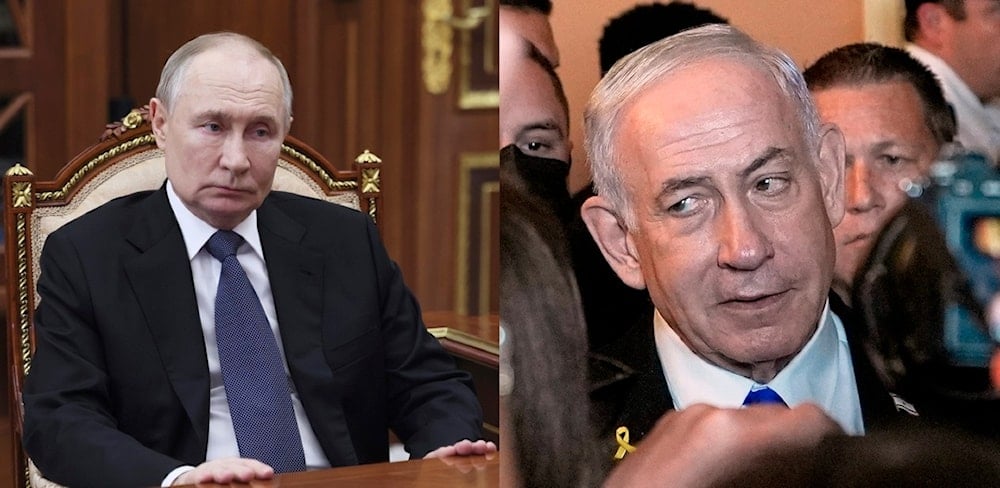Putin reaffirms Syria's sovereignty in call with Netanyahu
Russian President Vladimir Putin expressed strong disapproval of the Israeli regime's deadly airstrikes on Syria.
-

Russian President Vladimir Putin (Left) held a phone call with Israeli Prime Minister Benjamin Netnayahu (Right) on July 28, 2025 (AP collage)
Russian President Vladimir Putin expressed strong disapproval of the Israeli regime's latest military assaults on Syrian territory during a phone call with Prime Minister Benjamin Netanyahu on Monday.
The call followed Israeli air raids on the capital Damascus and the Druze-majority Sweida province, which Tel Aviv claimed were intended to "protect minorities" and enforce a demilitarized zone in the south.
According to a statement issued by the Kremlin, the Russian leader "emphasised the importance of supporting the unity, sovereignty, and territorial integrity of Syria," and reiterated that lasting peace can only emerge through a political process that ensures representation for all ethnic and religious communities.
The strikes, which resulted in several deaths and widespread displacement, come amid renewed Israeli efforts to assert military dominance across Syria's south. But observers note that such actions are not isolated.
They form part of a broader Israeli strategy of destabilization and land consolidation, particularly in and around the occupied Golan Heights, Syrian territory seized in 1967 and illegally annexed in 1981.
Golan Under Siege
For years, "Israel" has exploited the turmoil of the war on Syria to entrench its control over the Golan, carrying out hundreds of airstrikes and reinforcing its presence under the pretext of "national security." These moves aim not only to suppress Resistance factions, but also to prevent Syria from ever reclaiming its land, effectively enforcing a policy of creeping annexation under cover of regional instability.
Russia, which has maintained a military presence in Syria since 2015 through its Khmeimim airbase and Tartus naval port, has long opposed such unilateral campaigns. Its intervention was critical in preventing the collapse of the Syrian state during the Western- and Gulf-backed insurgency. Today, Moscow's strategic foothold in Syria serves as both a deterrent and a message: foreign-imposed regime change and territorial fragmentation will not be tolerated.
Following the ousting of former Syrian President Bashar al-Assad and the appointment of interim leader Ahmad al-Sharaa, Israeli officials have reportedly urged Washington to allow Russia to remain in Syria, viewing Moscow as a stabilizing force against both Turkish encroachment and the rise of Islamist factions hostile to Israeli interests. Yet, despite this pragmatic alignment, Russia's latest response signals growing unease with Tel Aviv's expanding military footprint and disregard for Syrian sovereignty.
Read more: "Israel" actively lobbying US to maintain Syria weak, divided: Reuters
Putin also used the call to offer Russian mediation in ongoing talks over Iran's nuclear program, reaffirming Moscow's commitment to regional diplomacy.
Territorial Resistance
The Kremlin's condemnation follows mounting international criticism of "Israel's" recent strikes. Syrian officials and human rights groups have decried the bombings as illegal acts of aggression that endanger regional security and violate multiple international laws.
The Russian Foreign Ministry echoed these concerns, calling on the global community to take a firm stance against what it labeled "gross violations" of Syrian territorial integrity.
While Moscow maintains economic and cultural ties with "Israel", facilitated in part by a large Russian-speaking population in Tel Aviv, its latest posture suggests a growing unwillingness to provide diplomatic cover for "Israel's" reckless adventurism and unlawful expansion.

 3 Min Read
3 Min Read










